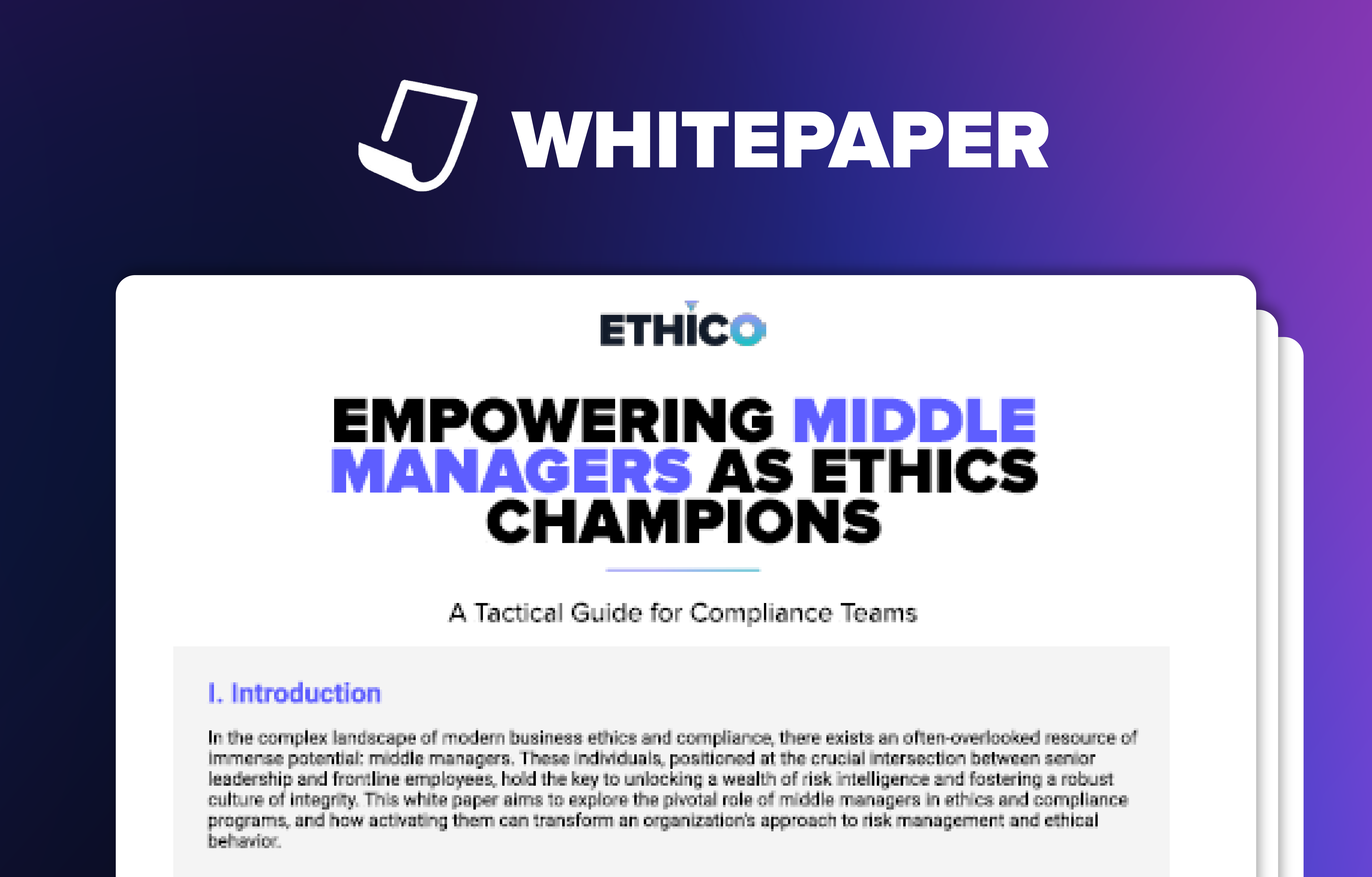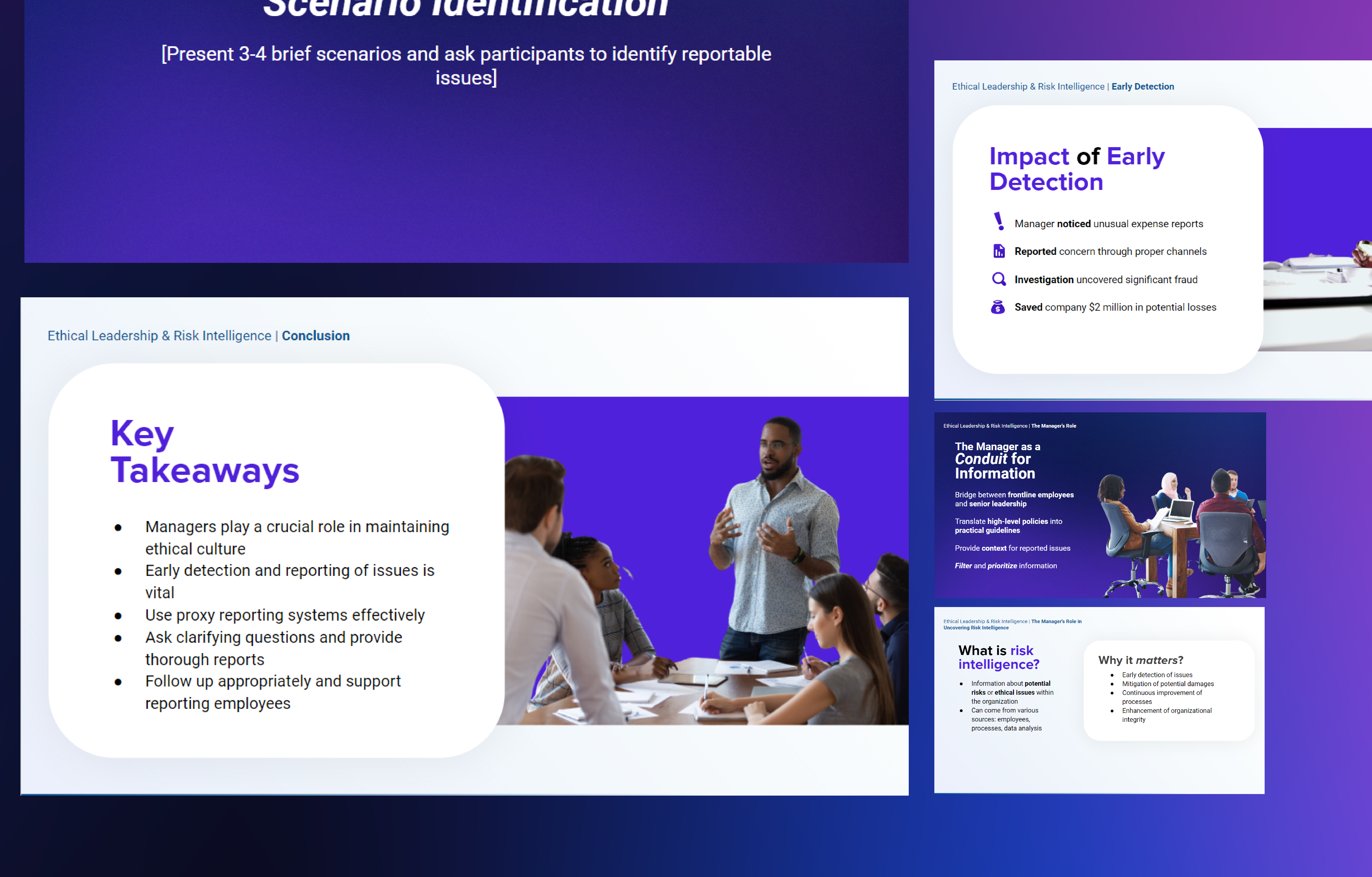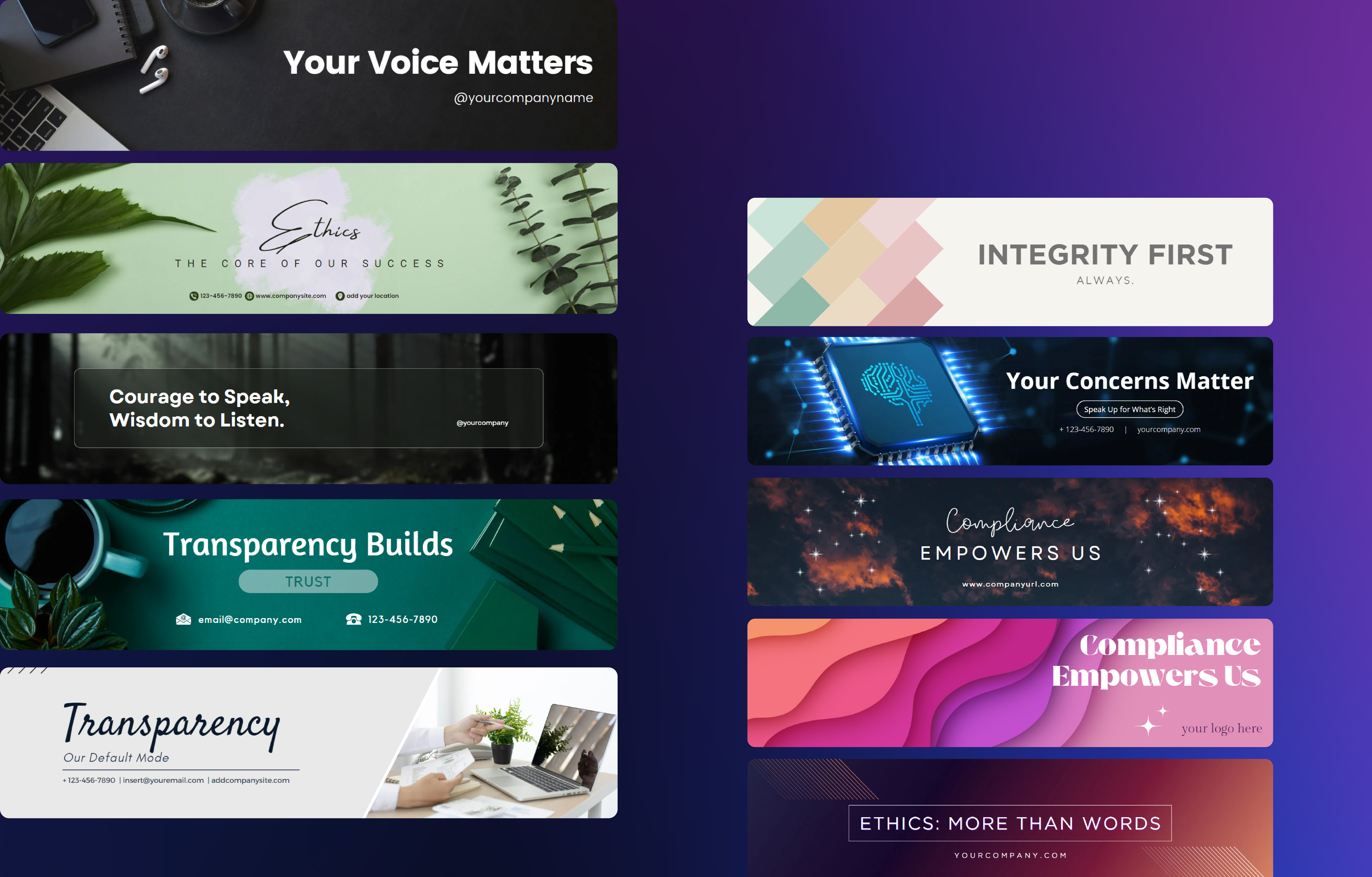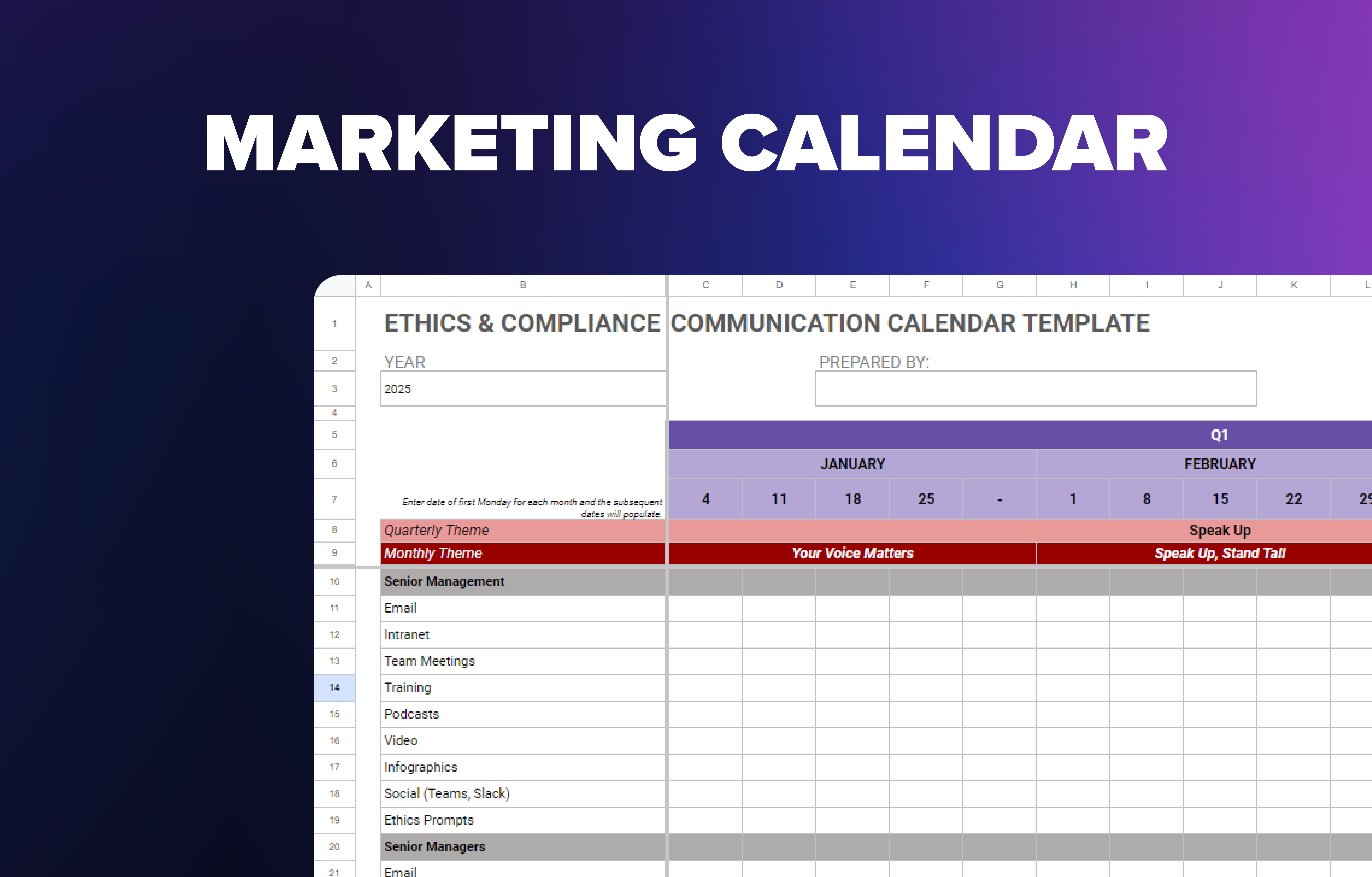Middle Managers Toolkit
Empowering middle managers to lead with integrity and drive compliance.
Enhanced Leadership
Empower managers to lead with integrity and confidence.
Improved Compliance
Strengthen your team’s adherence to ethical standards.
Effective Communication
Equip managers with prompts for clear, ethical dialogue.
Customizable Templates
Easily adapt resources to your company’s brand and needs.
Risk Mitigation
Identify and address potential issues before they escalate.
Employee Engagement
Foster a culture of openness and trust within your team.
Transforming Ethical Leadership.
Ethics and compliance are the backbone of any successful organization. Middle managers play a critical role in upholding these standards by bridging the gap between senior leadership and frontline employees. This toolkit equips you with the necessary resources to promote a culture of integrity, encourage open communication, and effectively manage compliance risks within your teams.
Why this toolkit matters.
Our comprehensive toolkit provides practical strategies, communication prompts, and customizable templates designed specifically for middle managers. By leveraging these tools, you can foster an environment where ethical behavior thrives, and employees feel empowered to speak up. This proactive approach not only enhances your team's performance but also strengthens the overall integrity of your organization.
- Set the tone for ethical behavior in your team
- Foster a speak-up culture where concerns are freely shared
- Serve as a conduit for risk intelligence between frontline and leadership
- Make ethical considerations a part of daily decision-making
- Legal violations: fraud, theft, discrimination, harassment
- Policy breaches: conflicts of interest, data privacy violations
- Ethical concerns: favoritism, inappropriate relationships, bullying
- Red flags: unusual financial transactions, drastic behavior changes, inconsistent documentation
- Consider cultural context: what's acceptable may vary across regions/cultures
Do:
- Use open-ended questions: "Can you tell me more about what happened?"
- Remain neutral: "What makes you feel that way?"
- Clarify: "When did you first notice this?"
Don't:
- Lead the conversation: "So, John stole the money, right?"
- Make promises: "I'll make sure this person is fired."
- Speculate: "I bet this has been going on for years."
Include in your report:
- Who was involved?
- What happened? Be specific and factual
- When and where did it occur?
- How was it discovered?
- Any evidence or documentation available?
Access proxy reporting system at: [Insert link]
Remember: Maintain strict confidentiality throughout the process
- Thank the employee for speaking up
- Set realistic expectations about the process and timeline
- Assure them of non-retaliation policy
- Provide support resources (e.g., Employee Assistance Program)
- For ongoing issues, document patterns and escalate as needed
- Ethics & Compliance Team: [Insert contact]
- HR Business Partner: [Insert contact]
- Anonymous Reporting Hotline: [Insert number]
- Code of Conduct: [Insert link]
2. "Our anonymous hotline is more than just a reporting tool—it's a testament to our commitment to transparency and accountability. Remember, every call is an opportunity to make our company better and stronger."
3. "Integrity isn't a sometimes thing—it's an all-the-time thing. This week, let's challenge ourselves to maintain our ethical standards even when faced with difficult decisions or tight deadlines."
4. "Speaking up takes courage, but it's the lifeblood of our ethical culture. Last year, employee reports led to significant improvements in our processes and saved the company millions. Your voice truly does matter."5. "Psychological safety is the foundation of high-performing teams. This week, let's focus on creating an environment where everyone feels safe to express their ideas, concerns, and even their mistakes without fear of ridicule or retribution."
6. "Ethics isn't about perfection—it's about consistent effort and improvement. Let's celebrate the small victories in our ethical journey this week, recognizing that every step forward strengthens our culture of integrity."
7. "Our no-retaliation policy isn't just a safeguard—it's a reflection of our values. We believe in protecting those who have the courage to speak up, because that's how we grow and improve as an organization."
8. "Integrity is like a muscle—it grows stronger with use. This week, let's look for opportunities to exercise our ethical decision-making skills, even in small, everyday situations."
9. "In the fable of the boy who cried wolf, the village stopped listening. But in our company, we always take concerns seriously. Every report is an opportunity to learn and improve, no matter how small it may seem."
10. "Ethical behavior is contagious. When we act with integrity, it inspires others to do the same. This week, let's be conscious of how our actions might influence those around us."
11. "Our hotline isn't just anonymous—it's a secure channel for your concerns. Think of it as a vault where your reports are protected, ensuring that sensitive information is handled with the utmost care and confidentiality."
12. "Choosing integrity often means choosing the harder path. This week, let's reflect on times when we've had to make difficult ethical decisions, and how those choices have shaped our personal and professional lives."
13. "Speaking up isn't just encouraged—it's an essential part of our collective responsibility. Your insights and observations are crucial in maintaining our ethical standards and driving continuous improvement."
14. "Psychological safety goes beyond just feeling safe to speak up—it's about creating an environment where diverse thoughts and perspectives are valued and respected. This week, let's focus on truly listening to and appreciating different viewpoints."
15. "Ethics isn't just about avoiding wrongdoing—it's about proactively doing what's right. This week, let's challenge ourselves to go above and beyond in our ethical practices, setting a new standard for integrity in our industry."
16. "Our no-retaliation policy is more than a protective measure—it's a commitment to justice and fairness. It ensures that those who speak up are championed, not penalized, for their courage."
17. "Integrity is the cornerstone of trust, both within our team and with our stakeholders. This week, let's reflect on how our commitment to ethics has built and strengthened relationships in our professional lives."
18. "Think of our ethics hotline as a compass for our organization. It helps guide us in the right direction when the path isn't clear, ensuring we stay true to our values even in challenging situations."
19. "Your voice is a powerful catalyst for positive change. Remember, some of the most significant improvements in company history started with a single employee speaking up about something they thought could be better."
20. "Psychological safety isn't just a feel-good concept—it's a key driver of innovation and problem-solving. When people feel safe to express themselves, we tap into a wealth of diverse ideas and perspectives."
21. "Our ethical journey is ongoing, with new challenges and learning opportunities at every turn. This week, let's share some of the ethical lessons we've learned recently, and how they've shaped our approach to work."
22. "Our commitment to integrity is like a tree—it needs constant nurturing to grow strong and withstand challenges. Every ethical decision we make, no matter how small, contributes to the growth of this tree."
23. "Speaking up can feel daunting, but remember—our no-retaliation policy is like a safety net, ensuring that those who raise concerns are protected and supported throughout the process."
24. "Integrity is a form of capital—it's the currency of trust and respect in the business world. This week, let's focus on how we can invest in our 'integrity accounts' and build our ethical wealth."
25. "Our ethics hotline is like a health check-up for our organization. Regular use helps us identify and address issues early, maintaining the overall wellbeing of our company culture."
26. "Your insights are invaluable. Last year, employee reports led to the development of three new best practices that have since been adopted company-wide. Never underestimate the impact of your voice."
27. "Psychological safety is about creating an environment where it's okay to be human—to make mistakes, to ask questions, to challenge the status quo. This week, let's focus on embracing our humanity at work."
28. "Ethics isn't just a department or a set of rules—it's the invisible thread that runs through every aspect of our organization. This week, let's try to make that thread more visible in our day-to-day work."
29. "Our no-retaliation policy is a shield that protects the integrity of our entire organization. It ensures that truth can flourish, unimpeded by fear or intimidation."
30. "Integrity is like a boomerang—the positive energy we put out into the world through our ethical actions often comes back to us in unexpected ways. This week, let's reflect on how our integrity has benefited us and our team."
31. "Think of our ethics hotline as a pressure release valve for our organization. It provides a safe outlet for concerns, preventing the build-up of issues that could otherwise harm our culture and operations."
32. "Your voice has the power to shape our organization. Remember, some of the most significant corporate scandals in history could have been prevented if just one person had spoken up. Your courage matters."
33. "Psychological safety is the fertile soil where innovation, creativity, and problem-solving flourish. By fostering an environment of trust and openness, we're setting the stage for breakthrough ideas and solutions."
34. "Ethics isn't about having all the answers—it's about asking the right questions. This week, let's practice ethical inquiry, challenging assumptions and exploring the moral dimensions of our work."
35. "Our commitment to integrity is our North Star—a constant guide that helps us navigate through complex and challenging situations. When in doubt, we can always look to our values for direction."
36. "Speaking up might feel like rocking the boat, but sometimes that's exactly what's needed to steer us in a better direction. Your willingness to raise concerns is an act of loyalty to our organization and its values."
37. "Integrity is the bridge that connects our actions to our values. Every time we act with integrity, we strengthen that bridge, making it easier for others to follow in our footsteps."
38. "Our ethics hotline is like a safety valve—it helps us release the pressure of ethical concerns before they can cause damage to our organization. Using it is a sign of strength, not weakness."
39. "Your unique perspective is a crucial piece of our ethical puzzle. Without your input, we're operating with an incomplete picture. Your voice helps us see the full ethical landscape of our organization."
40. "Psychological safety isn't just about feeling safe to speak up—it's about feeling safe to be your authentic self at work. This week, let's focus on creating an environment where everyone can bring their whole selves to work."
41. "Ethics isn't confined to our professional lives—it's a way of being that extends into all areas of our lives. This week, let's reflect on how our commitment to integrity at work influences our personal lives, and vice versa."
42. "Our no-retaliation policy is like our organization's immune system—it protects the health of our ethical culture by ensuring that those who speak up are defended against any form of retaliation."
43. "Integrity is our moral compass, always pointing us toward what's right, even when the path is difficult. This week, let's tune into that inner compass and let it guide our decisions and actions."
44. "Think of our ethics hotline as a fitness center for our organizational integrity. Each report is an opportunity to exercise our ethical muscles and become stronger as a company."
45. "Your voice is like an early warning system for our organization. By speaking up about potential issues, you help us address problems proactively, before they can escalate into crises."
46. "Psychological safety is about creating a climate where people feel safe to take risks and be vulnerable. This week, let's challenge ourselves to step out of our comfort zones and embrace new perspectives."
47. "Ethics isn't just about avoiding negative headlines—it's about writing a positive story for our organization. Every ethical decision we make is a sentence in that story. What legacy do we want to leave?"
48. "Our commitment to integrity is a marathon, not a sprint. It requires sustained effort and dedication. This week, let's focus on building our ethical endurance, preparing ourselves for the long-term journey of principled leadership."
49. "Speaking up is like planting a seed of positive change. You might not see the results immediately, but rest assured, your courage is contributing to the growth of a more ethical, transparent, and resilient organization."
50. "Integrity is the root system of our organizational values. It may be invisible, but it provides the stability and nourishment our company needs to thrive. This week, let's tend to those roots."
51. "Our ethics hotline is like a safety net for our organization, catching issues that might otherwise slip through the cracks. Remember, no concern is too small—every report contributes to the strength of our ethical culture."
52. "Your voice, combined with others, creates a powerful chorus for integrity. As we close out the year, let's reflect on how our collective commitment to ethics has shaped our team, our company, and our industry. Here's to another year of ethical excellence!"
1. "In healthcare, ethics isn't just about following rules—it's about saving lives. This week, let's reflect on how our commitment to integrity directly impacts patient outcomes and safety."
2. "Our anonymous reporting system isn't just a hotline—it's a lifeline for patient safety. Remember, every report has the potential to prevent a medical error or improve care quality."
3. "Integrity in healthcare means being meticulous even when tired. This week, let's focus on maintaining our high standards, especially during long shifts or challenging cases."
4. "Speaking up in healthcare can literally save lives. Last year, a staff member's report led to a change in our medication protocol that significantly reduced adverse drug events. Your voice matters more than you know."
5. "Psychological safety in healthcare teams isn't just about comfort—it's about creating an environment where everyone feels empowered to advocate for patient safety, regardless of their role."
6. "In healthcare, ethical decisions often happen in split seconds. Let's practice ethical decision-making in our daily routines, so we're prepared when critical moments arise."
7. "Our no-retaliation policy protects not just our staff, but our patients too. When healthcare workers feel safe to speak up, patient care improves. It's that simple."
8. "Integrity in healthcare is like hand hygiene—it needs to be practiced consistently to be effective. This week, let's be mindful of 'washing our hands' with integrity before every patient interaction."
9. "In healthcare, we can't afford to cry wolf—but we also can't afford to stay silent. Every concern raised is a potential opportunity to enhance patient safety and care quality."
10. "Ethical behavior in healthcare is contagious—and it's an infection we want to spread! This week, let's focus on how our actions can inspire ethical conduct throughout our organization."
11. "Our reporting system isn't just confidential—it's a critical tool for continuous improvement in patient care. Think of it as a vital sign monitor for our organization's ethical health."
12. "In healthcare, choosing integrity often means having difficult conversations. This week, let's reflect on times when we've had to speak up for patient safety, even when it was uncomfortable."
13. "Speaking up isn't just encouraged in healthcare—it's a professional obligation. Your insights could be the key to preventing a never event or improving a patient's experience."
14. "Psychological safety in healthcare teams leads to better communication, which directly impacts patient outcomes. This week, let's focus on creating an environment where all team members feel heard and valued."
15. "Ethics in healthcare goes beyond 'do no harm'—it's about actively striving to provide the best possible care. This week, let's challenge ourselves to go above and beyond for our patients."
16. "Our no-retaliation policy is a cornerstone of patient safety. It ensures that those who speak up for patient well-being are protected and supported."
17. "Integrity is the foundation of trust in healthcare. This week, let's reflect on how our ethical actions build trust with patients, families, and colleagues."
18. "Think of our ethics reporting system as a diagnostic tool for our organization. It helps us identify and treat issues before they become serious problems for our patients or staff."
19. "Your voice is a powerful tool for improving patient care. Remember, some of the most significant advancements in healthcare started with a single person speaking up about something they thought could be better."
20. "Psychological safety in healthcare isn't a luxury—it's a necessity for high-quality care. When team members feel safe to express concerns, we catch mistakes earlier and innovate faster."
21. "Our ethical journey in healthcare is ongoing, with new challenges emerging as technology and treatments advance. This week, let's discuss recent ethical dilemmas we've faced and how we navigated them."
22. "Our commitment to integrity in healthcare is like preventive medicine—it requires constant attention to ward off ethical lapses and maintain the health of our organization."
23. "Speaking up in healthcare can feel daunting, but remember—our no-retaliation policy is like PPE for your career, protecting you as you protect our patients."
24. "Integrity in healthcare is our most valuable asset—it's the currency of trust with our patients and the community. This week, let's focus on how we can invest in our 'integrity accounts'."
25. "Our ethics reporting system is like a health screening for our organization. Regular use helps us identify and address issues early, maintaining the overall wellbeing of our healthcare community."
26. "Your insights are invaluable in healthcare. Last year, staff reports led to three new best practices in patient safety that have since been adopted hospital-wide. Never underestimate the impact of your voice."
27. "Psychological safety in healthcare means creating an environment where it's okay to admit mistakes or ask for help. This week, let's focus on fostering a culture of openness and continuous learning."
28. "Ethics isn't just a department in our hospital—it's the lifeblood that flows through every ward, clinic, and office. This week, let's make our commitment to ethics more visible in our day-to-day work."
29. "Our no-retaliation policy is like an immune system for our ethical culture. It protects those who speak up, ensuring that patient safety always comes first."
30. "Integrity in healthcare is like a boomerang—the compassion and honesty we show our patients often comes back to us in unexpected ways. Let's reflect on positive patient interactions that resulted from our ethical actions."
31. "Think of our ethics reporting system as a pressure release valve for our organization. It provides a safe outlet for concerns, preventing the build-up of issues that could compromise patient care."
32. "Your voice has the power to transform patient care. Remember, many patient safety initiatives started because one healthcare worker spoke up. Your courage can save lives."
33. "Psychological safety in healthcare teams is the fertile ground where innovation in patient care flourishes. By fostering trust and openness, we set the stage for breakthroughs in treatment and care delivery."
34. "Ethics in healthcare isn't about having all the answers—it's about asking the right questions. This week, let's practice ethical inquiry in our patient care decisions."
35. "Our commitment to integrity is our North Star in the complex world of healthcare. When faced with difficult decisions, we can always look to our values for guidance."
36. "Speaking up in healthcare might feel like rocking the boat, but sometimes that's exactly what's needed to steer us toward better patient care. Your willingness to raise concerns is an act of compassion."
37. "Integrity is the thread that weaves together all aspects of patient care. Every time we act with integrity, we strengthen the fabric of trust between healthcare providers and patients."
38. "Our ethics reporting system is like a safety valve in our high-pressure healthcare environment. It helps us release the tension of ethical concerns before they can impact patient care."
39. "Your unique perspective is crucial in healthcare. Without your input, we're not seeing the full picture of our patients' needs. Your voice helps us provide more comprehensive, patient-centered care."
40. "Psychological safety in healthcare isn't just about feeling safe to speak up—it's about feeling supported in providing the best possible patient care. This week, let's focus on supporting each other in our commitment to excellence."
41. "Ethics in healthcare extends beyond our professional lives—it shapes how we view health and wellness in our personal lives too. This week, let's reflect on how our commitment to healthcare ethics influences our own health decisions."
42. "Our no-retaliation policy is like a vaccine for our ethical culture—it prevents the spread of fear and silence that can compromise patient safety."
43. "Integrity is our moral compass in the complex landscape of modern healthcare. This week, let's tune into that inner compass and let it guide our patient care decisions."
44. "Think of our ethics reporting system as a wellness check for our organization. Each report is an opportunity to improve our health as a healthcare provider."
45. "Your voice is like an early warning system for patient safety. By speaking up about potential issues, you help us address problems proactively, before they can harm our patients."
46. "Psychological safety in healthcare is about creating a climate where people feel safe to innovate and improve patient care. This week, let's challenge ourselves to propose new ideas for enhancing our services."
47. "Ethics in healthcare isn't just about avoiding malpractice—it's about setting new standards of care. Every ethical decision we make contributes to advancing the field of medicine."
48. "Our commitment to integrity in healthcare is a marathon, not a sprint. It requires sustained effort and dedication. This week, let's focus on building our ethical endurance for the long-term journey of patient care."
49. "Speaking up in healthcare is like planting a seed of improvement in patient care. You might not see the results immediately, but your courage contributes to the growth of a safer, more effective healthcare system."
50. "Integrity is the root system of our healthcare values. It provides the stability and nourishment our organization needs to provide excellent patient care. This week, let's tend to those roots."
51. "Our ethics reporting system is like a safety net for our patients, catching issues that might otherwise slip through the cracks. Remember, no concern is too small when it comes to patient safety."
52. "Your voice, combined with others, creates a powerful force for positive change in healthcare. As we close out the year, let's reflect on how our collective commitment to ethics has improved patient outcomes, enhanced safety, and advanced our mission of care. Here's to another year of ethical excellence in healthcare!"
1. "In manufacturing, our commitment to ethics directly impacts product quality and worker safety. This week, let's reflect on how our integrity ensures that every item leaving our factory meets the highest standards of safety and reliability."
2. "Our anonymous reporting system is more than just a hotline—it's a critical tool for preventing accidents and ensuring product integrity. Last year, an employee report led to a process improvement that reduced defects by 15%."
3. "Integrity in manufacturing means maintaining quality even when production pressures are high. Remember, cutting corners may seem tempting to meet deadlines, but it compromises our values and potentially puts consumers at risk."
4. "Speaking up about safety concerns isn't just encouraged—it's a fundamental responsibility. A single observation could prevent a serious accident. Last month, an employee's report about a near-miss incident led to a safety protocol upgrade that's now being implemented company-wide."
5. "Psychological safety on our factory floor is as important as physical safety. When team members feel safe to voice concerns without fear of ridicule or retaliation, we create an environment where problems are caught early and innovations flourish."
6. "Ethics in manufacturing extends beyond our factory walls. Our commitment to integrity impacts the entire supply chain, from raw material sourcing to end-user safety. This week, let's consider how our decisions affect stakeholders at every stage of production."
7. "Our no-retaliation policy isn't just about protection—it's about fostering a culture of continuous improvement. When employees feel safe to report issues, we gain valuable insights that drive efficiency and quality. Last quarter, employee suggestions led to a 7% increase in production efficiency."
8. "Integrity in our work is like the quality control process for our character. Just as we rigorously test our products, we should regularly examine our actions to ensure they align with our ethical standards. This self-reflection strengthens our ethical muscle memory."
9. "In manufacturing, the 'cry wolf' syndrome can be dangerous. That's why we take every report seriously, no matter how small. Remember, major industrial accidents often result from a series of minor oversights. Your vigilance matters."
10. "Ethical behavior on the production line is contagious. When we consistently demonstrate integrity in our work, it sets a standard for the entire team. This week, let's be mindful of how our actions influence those around us."
11. "Our reporting system is like a diagnostic tool for our ethical health. It helps us identify and address issues before they become major problems. Last year, reports through this system helped us prevent two potential regulatory violations."
12. "In manufacturing, choosing integrity often means making tough calls that might temporarily slow production but ensure long-term quality and safety. This week, let's reflect on times when we've had to prioritize ethics over expediency."
13. "Speaking up isn't just encouraged in our factory—it's an essential part of our quality assurance process. Your insights on the production floor are invaluable for maintaining our high standards. Remember, you are our first line of defense against defects and safety issues."
14. "Psychological safety in our teams leads to better problem-solving and innovation. When everyone feels free to contribute ideas, we tap into a wealth of knowledge and experience. This month, a team member's suggestion led to a process improvement that reduced waste by 10%."
15. "Ethics in manufacturing goes beyond compliance—it's about striving for excellence in everything we do. This week, let's challenge ourselves to find ways to exceed regulatory standards and set new benchmarks for our industry."
16. "Our no-retaliation policy is a cornerstone of our safety culture. It ensures that those who speak up about potential hazards or quality issues are protected and valued. This policy has been crucial in identifying and addressing 23 safety concerns in the past year alone."
17. "Integrity is the foundation of trust—with our colleagues, our customers, and our community. When we consistently act with integrity, we build a reputation that becomes our strongest asset. This week, let's consider how our ethical actions contribute to our company's reputation."
18. "Think of our ethics reporting system as preventive maintenance for our organizational integrity. Regular use helps us identify and address issues early, much like how routine equipment checks prevent costly breakdowns."
19. "Your voice on the factory floor is a powerful tool for positive change. Remember, some of the most significant improvements in manufacturing history started with a single worker's observation. Last year, an employee's suggestion led to a 5% reduction in energy consumption."
20. "Psychological safety isn't just about feeling comfortable—it's about creating an environment where innovation thrives. When team members feel safe to propose new ideas, we unlock potential for groundbreaking improvements in our processes and products."
21. "Our ethical journey in manufacturing is ongoing, with new challenges emerging as technology advances. This week, let's discuss how we're adapting our ethical practices to keep pace with innovations like AI and IoT in our production processes."
22. "Our commitment to integrity is like preventive maintenance for our organizational culture. It requires constant attention to prevent ethical wear and tear. This vigilance has helped us maintain an impressive safety record, with zero lost-time accidents in the past 18 months."
23. "Speaking up about ethical concerns can feel daunting, but remember—our no-retaliation policy is like PPE for your career, protecting you as you protect our company's integrity. This protection has encouraged a 30% increase in employee reports over the past year."
24. "Integrity in manufacturing is our most valuable product. It's the invisible component in everything we make, ensuring quality, safety, and reliability. This week, let's focus on how we can 'manufacture' more integrity in our daily work."
25. "Our ethics reporting system is like a quality control check for our organizational behavior. Regular use helps us maintain high standards of conduct, just as our QC processes ensure product excellence. Last quarter, this system helped us identify and correct three potential compliance issues."
26. "Your insights are invaluable in our continuous improvement process. Last year, employee reports led to five new best practices in our production line that have since been adopted company-wide. Never underestimate the impact of your observations."
27. "Psychological safety in our teams means creating an environment where it's okay to admit mistakes or ask for help. This openness is crucial for preventing small errors from becoming big problems. This culture of openness has contributed to a 25% reduction in production errors over the past year."
28. "Ethics isn't just a department in our company—it's a critical component in every product we manufacture. This week, let's make our commitment to ethics more visible in our day-to-day operations, from the supply chain to the shipping dock."
29. "Our no-retaliation policy is like a safety guard for our ethical machinery. It protects those who speak up, ensuring that integrity is never compromised in pursuit of production goals. This policy has been instrumental in maintaining our ISO 9001 certification."
30. "Integrity in manufacturing is like a precision tool—it ensures accuracy and reliability in everything we do. The trust we build through consistent ethical behavior has led to a 15% increase in repeat business from our top clients this year."
31. "Think of our ethics reporting system as a pressure relief valve for our organization. It provides a safe outlet for concerns, preventing the build-up of issues that could compromise our operations or reputation. This system has helped us address 17 potential safety hazards this year before they led to incidents."
32. "Your voice has the power to transform our manufacturing processes. Remember, many safety innovations started because one worker spoke up. Your courage to report issues or suggest improvements could prevent accidents and save lives."
33. "Psychological safety in our teams is the foundation for lean manufacturing success. When team members feel safe to point out inefficiencies or suggest improvements, we can truly optimize our processes. This open culture has contributed to a 20% reduction in production waste over the past two years."
34. "Ethics in manufacturing isn't about having all the answers—it's about asking the right questions. This week, let's practice ethical inquiry in our decision-making processes, from material sourcing to quality control."
35. "Our commitment to integrity is our North Star in the complex world of modern manufacturing. When faced with difficult decisions about cost-cutting or production quotas, we can always look to our values for guidance. This ethical compass has helped us navigate challenging market conditions while maintaining our quality standards."
36. "Speaking up in manufacturing might feel like it could slow down production, but it's essential for long-term efficiency and safety. Your willingness to raise concerns is an investment in our future success. Employee feedback has led to a 12% improvement in our overall equipment effectiveness this year."
37. "Integrity is the thread that weaves together all aspects of our manufacturing process. Every time we act with integrity, we strengthen the fabric of trust between our company, our employees, and our customers. This strong ethical foundation has contributed to a 95% customer satisfaction rate."
38. "Our ethics reporting system is like a safety valve in our high-pressure manufacturing environment. It helps us release the tension of ethical concerns before they can impact our operations or product quality. This system has been crucial in maintaining our impressive safety record of 500 days without a lost-time accident."
39. "Your unique perspective on the production floor is crucial for our success. Without your input, we might miss important details that affect product quality or worker safety. Your voice helps us maintain our commitment to excellence. Employee insights have led to three patent applications for process improvements in the past year."
40. "Psychological safety in our teams isn't just about feeling comfortable—it's about feeling empowered to excel in your role. This week, let's focus on how we can support each other in achieving peak performance while upholding our ethical standards. This supportive environment has contributed to a 30% reduction in employee turnover."
41. "Ethics in manufacturing extends beyond our factory—it influences how we interact with our community and environment. This week, let's reflect on how our commitment to ethical production contributes to sustainability and social responsibility. Our ethical practices have helped us reduce our carbon footprint by 25% over the past three years."
42. "Our no-retaliation policy is like a vaccine for unethical behavior—it prevents the spread of fear and silence that can compromise our integrity and safety. This policy has been key to uncovering and addressing 14 potential compliance issues in the past year."
43. "Integrity is our moral compass in the fast-paced world of manufacturing. This week, let's tune into that inner compass and let it guide our decisions, from the smallest task to the biggest strategic choice. This ethical guidance has helped us secure contracts with two major new clients who prioritize supplier integrity."
44. "Think of our ethics reporting system as a continuous improvement tool for our organization. Each report is an opportunity to refine our processes and strengthen our ethical culture. This system has driven 28 process improvements in the past year, enhancing both efficiency and safety."
45. "Your voice is like an early warning system for quality and safety issues. By speaking up about potential problems, you help us address issues proactively, before they can affect our products or our people. Employee vigilance has helped us achieve a 99.9% defect-free rate this quarter."
46. "Psychological safety in our teams is about creating a climate where people feel safe to innovate and improve our manufacturing processes. This week, let's challenge ourselves to propose new ideas for enhancing our operations. This culture of innovation has led to a 15% increase in production efficiency over the past year."
47. "Ethics in manufacturing isn't just about avoiding mistakes—it's about setting new standards of excellence. Every ethical decision we make contributes to advancing our industry. Our commitment to ethical manufacturing has earned us recognition as an industry leader in corporate responsibility."
48. "Our commitment to integrity in manufacturing is a marathon, not a sprint. It requires sustained effort and dedication. This week, let's focus on building our ethical endurance for the long-term journey of excellence. This sustained commitment has helped us maintain ISO 14001 environmental management certification for five consecutive years."
49. "Speaking up in our factory is like planting a seed of improvement. You might not see the results immediately, but your courage contributes to the growth of a safer, more efficient, and more ethical manufacturing process. Employee suggestions have led to a 40% reduction in workplace injuries over the past three years."
50. "Integrity is the foundation of our manufacturing excellence. It provides the stability and trust our organization needs to innovate and grow. This week, let's reinforce that foundation in everything we do. Our strong ethical reputation has helped us attract top talent, reducing our time-to-hire by 20%."
51. "Our ethics reporting system is like a safety net for our entire operation, catching issues that might otherwise slip through the cracks. Remember, no concern is too small when it comes to maintaining our high standards. This system has helped us identify and address 32 potential safety hazards this year before they could lead to incidents."
52. "Your voice, combined with others, creates a powerful force for positive change in our manufacturing processes. As we close out the year, let's reflect on how our collective commitment to ethics has improved safety, enhanced quality, and advanced our mission of excellence. Our ethical culture has contributed to a 10% increase in productivity and a 20% decrease in customer complaints. Here's to another year of ethical excellence in manufacturing!"
‾
Ethical Communication Prompts
104 conversation prompts that middle managers can use to generate discussions about ethics, integrity, culture, safety, speaking up, non-retaliation, transparency, and doing the right thing. These prompts cover a wide range of topics related to ethics, integrity, safety, and organizational culture. They can be used to stimulate thoughtful discussions and encourage team members to reflect on these important issues in the context of their daily work.
- What does integrity mean to you in your daily work?
- How can we make it easier for team members to speak up about concerns?
- What's an example of a time when you saw someone demonstrate strong ethical behavior?
- How can we improve transparency in our team's decision-making processes?
- What safety concerns, if any, have you noticed recently?
- How can we better support team members who raise ethical concerns?
- What does "doing the right thing" mean in our line of work?
- How can we make our team's culture more inclusive and respectful?
- What's a small way we could improve our ethical standards this week?
- How can we ensure that our non-retaliation policy is understood by everyone?
- What's an ethical dilemma you've faced at work, and how did you handle it?
- How can we make safety a more integral part of our daily conversations?
- What does transparency look like in our team? How can we improve it?
- How can we encourage more open dialogue about ethical issues?
- What's one thing we could do to make our workplace safer?
- How can we better align our actions with our stated values?
- What barriers might prevent someone from speaking up about a concern?
- How can we make our ethical standards clearer to new team members?
- What's an example of a time when speaking up made a positive difference?
- How can we create a culture where asking for help is encouraged?
- What does ethical leadership look like in our team?
- How can we better recognize and reward ethical behavior?
- What's a safety rule that you think is often overlooked, and why?
- How can we make our decision-making processes more transparent?
- What's an ethical challenge you think our industry will face in the future?
- How can we better support whistleblowers in our organization?
- What's a small way we could improve our team's integrity this week?
- How can we ensure that safety remains a top priority, even during busy periods?
- What does "walking the talk" in terms of ethics look like in our team?
- How can we make our ethical expectations clearer to suppliers and partners?
- What's an example of a gray area in ethics that you've encountered at work?
- How can we make our team more comfortable discussing uncomfortable topics?
- What's one way we could improve the reporting process for ethical concerns?
- How can we better integrate ethics into our performance evaluations?
- What's a safety improvement you'd like to see implemented?
- How can we ensure that all team members feel safe to speak up?
- What's an example of a time when transparency helped solve a problem?
- How can we make our ethical training more engaging and relevant?
- What's a way we could improve work-life balance in our team?
- How can we better communicate the outcomes of reported concerns?
- What's an ethical principle that you think is particularly important in our work?
- How can we create a culture where mistakes are seen as learning opportunities?
- What's a way we could make our safety procedures more user-friendly?
- How can we ensure that ethical considerations are part of every major decision?
- What's an example of a time when you were proud of our team's integrity?
- How can we make our non-retaliation policy more effective?
- What's a way we could improve communication about ethical issues in our team?
- How can we ensure that remote workers feel included in our ethical culture?
- What's a safety concern that you think deserves more attention?
- How can we make our ethical standards more visible in our daily work?
- What's an example of a time when you had to prioritize ethics over expediency?
- How can we create a culture where people feel comfortable admitting mistakes?
- What's a way we could make our ethical reporting process more accessible?
- How can we better recognize team members who consistently demonstrate integrity?
- What's a safety practice from another industry that we could adopt?
- How can we ensure that ethical behavior is consistently rewarded?
- What's an example of a time when lack of transparency caused problems?
- How can we make ethics a more regular part of our team discussions?
- What's a way we could improve the onboarding process to emphasize our ethical culture?
- How can we better support team members who are facing ethical dilemmas?
- What's a safety rule that you think needs updating, and why?
- How can we ensure that all voices are heard in ethical discussions?
- What's an example of a time when doing the right thing was particularly challenging?
- How can we make our ethical expectations clearer to customers and clients?
- What's a way we could improve psychological safety in our team?
- How can we ensure that ethical considerations are part of our innovation process?
- What's an example of a time when speaking up prevented a potential problem?
- How can we make our ethical standards more resilient to external pressures?
- What's a safety improvement that has made a big difference in your work?
- How can we better integrate ethics into our project planning processes?
- What's an example of a time when our team's integrity was tested?
- How can we create a culture where ethical behavior is the default?
- What's a way we could make our safety training more effective?
- How can we ensure that ethics is considered in our use of new technologies?
- What's an example of a time when transparency helped build trust?
- How can we make our ethical standards more adaptable to changing circumstances?
- What's a way we could improve how we handle conflicts of interest?
- How can we ensure that our ethical culture extends to all levels of the organization?
- What's a safety concern that you think is often overlooked in our industry?
- How can we make our ethical decision-making process more inclusive?
- What's an example of a time when you saw someone demonstrate moral courage?
- How can we create a culture where ethical behavior is seen as a competitive advantage?
- What's a way we could improve how we communicate about safety issues?
- How can we ensure that our ethical standards are applied consistently across all departments?
- What's an example of a time when our team's transparency was particularly beneficial?
- How can we make our ethical training more scenario-based and practical?
- What's a way we could improve how we handle confidential information?
- How can we ensure that ethics is a key consideration in our hiring processes?
- What's a safety practice that you think we should adopt from another team or department?
- How can we create a culture where ethical behavior is celebrated and shared?
- What's an example of a time when you had to navigate a complex ethical situation?
- How can we make our ethical standards more visible to external stakeholders?
- What's a way we could improve how we address potential conflicts of interest?
- How can we ensure that our ethical culture remains strong during times of change or stress?
- What's a safety improvement that you think would make a big difference in our daily work?
- How can we make our ethical reporting process more user-friendly?
- What's an example of a time when our team's integrity helped us overcome a challenge?
- How can we create a culture where ethical considerations are part of every conversation?
- What's a way we could improve how we handle ethical gray areas?
- How can we ensure that our commitment to safety doesn't waver under production pressures?
- What's an example of a time when speaking up about a small issue prevented a larger problem?
- How can we make our ethical standards more meaningful to each individual team member?
- What's a way we could improve how we recognize and reward safe behavior?
- How can we ensure that our ethical culture continues to evolve and improve over time?









